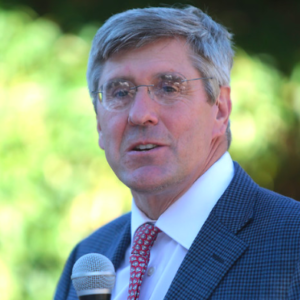President Trump’s Fed nominees Stephen Moore and Herman Cain, friends and occasional professional colleagues of mine, are being pilloried by the Neo-Keynesians for being “gold bugs.” That’s doubly wrong.
Moore considers the gold standard superior to the fiduciary paper standard we now have. That said, he’s no proponent. He is an advocate of commodity-price targeting. This regime was advocated by former Fed governor Wayne Angell. While debatable, it’s respectable.
Cain’s history of championing the gold standard appears in his 2012 op-ed in the Wall Street Journal: We Need A Dollar As Good As Gold. Of Cain’s campaign tome, “9-9-9: An Army of Davids,” I wrote in Forbes at the time, Jack Kemp’s “mantle has fallen, at least provisionally, upon Herman Cain’s shoulders. … Kemp, for example, was the last modern political champion of the gold standard. In ‘9–9–9’ … Cain devotes over a quarter of the book to passionate advocacy of the gold standard.”
One op-ed and a quarter of a campaign book spread over a lifetime does not rise to the level of a “gold bug.” Cain’s professional history shows him a pragmatist, not a dogmatist. “Gold bugs” — like President William McKinley and me (I was one of the 23 official witnesses before the Reagan Gold Commission and one of very few proponents) — tend to be more emphatic.
That said, the gold standard just isn’t buggy. No less than Tyler Cowen recently wrote at Bloomberg: “Whatever the imperfections of a gold standard might be, monetary authorities make a lot of mistakes, too. Furthermore, in the broader historical context, including the more distant past, the gold standard doesn’t look so bad.”
The Bank of England issued Financial Stability Paper No. 13 in 2011. Charles Kadlec summarized some of that report’s findings at forbes.com:
“Ever since President Richard Nixon in 1971 killed the Bretton Woods international monetary system by breaking the link between the dollar and gold, the U.S. economy has experienced slower growth, higher average inflation, higher unemployment rates, more bank failures and a series of financial crises that, in total, have reduced our income by about a third.
“Now, a Bank of England study with the ambitious title, ‘Reform of the International Monetary and Financial System,’ shows that the entire world economy has suffered a similar fate.”
Among Moore’s most enthusiastic critics is the dignified George Selgin, a meticulous scholar (and a friend). Selgin seems piqued by Moore’s lack of scholarly rigor. Just so! Rigorous scholarship is just not Moore’s forte.
But Selgin and Moore have some common ground. As lead co-author of Cato Institute Working Paper No. 2, Has the Fed Been A Failure, Selgin, with William D. Lastrapes and Lawrence H. White, writes:
“(1) The Fed’s full history (1914 to present) has been characterized by more rather than fewer symptoms of monetary and macroeconomic instability than the decades leading to the Fed’s establishment. (2) While the Fed’s performance has undoubtedly improved since World War II, even its postwar performance has not clearly surpassed that of its undoubtedly flawed predecessor, the National Banking system, before World War I. (3) Some proposed alternative arrangements might plausibly do better than the Fed as presently constituted.”
Selgin believes — laudably — that the Fed could use some powerful reform. This distinguished economist advocates a nominal gross domestic product targeting rule. Selgin’s gentility ought not to obscure the substantive point that the Fed is overdue to examine its protocols.
And let’s consider the larger context. President Trump is a, perhaps together with Lewis Lehrman, George Gilder and Steve Forbes the, leading gold sympathizer. As I wrote at Forbes.com about Trump on the stump:
“… Trump shows a strong affinity for gold. He has also shown a keen intuitive grasp of how the gold standard was crucial to having made America great:
“Donald Trump: “We used to have a very, very solid country because it was based on a gold standard,” he told WMUR television in New Hampshire in March last year. But he said it would be tough to bring it back because “we don’t have the gold. Other places have the gold.”
“Trump’s comment to GQ: “Bringing back the gold standard would be very hard to do, but boy, would it be wonderful. We’d have a standard on which to base our money.”
“Trump has been misled to believe that ‘we don’t have the gold. Other places have the gold.’ In fact, the United States, Germany and the IMF together have about as much gold as the rest of the world combined and America has well more than Germany and the IMF combined.”
Attacks on Moore and Cain for their sympathy toward the golden rule are proxy attacks on Trump. The attacks are ill-considered. America would be well served by sending Moore and Cain to be governors of the Fed.
America would benefit from a Fed that lived by “the golden rule” or another well-considered rule. Moore and Cain are well qualified to challenge the economic status quo that has flunked inspection and at least correlates with a Little Dark Age of economic stagnation. By promoting a rule-based economic policy Moore and Cain could be instrumental in helping to unleash an era of equitable prosperity.

